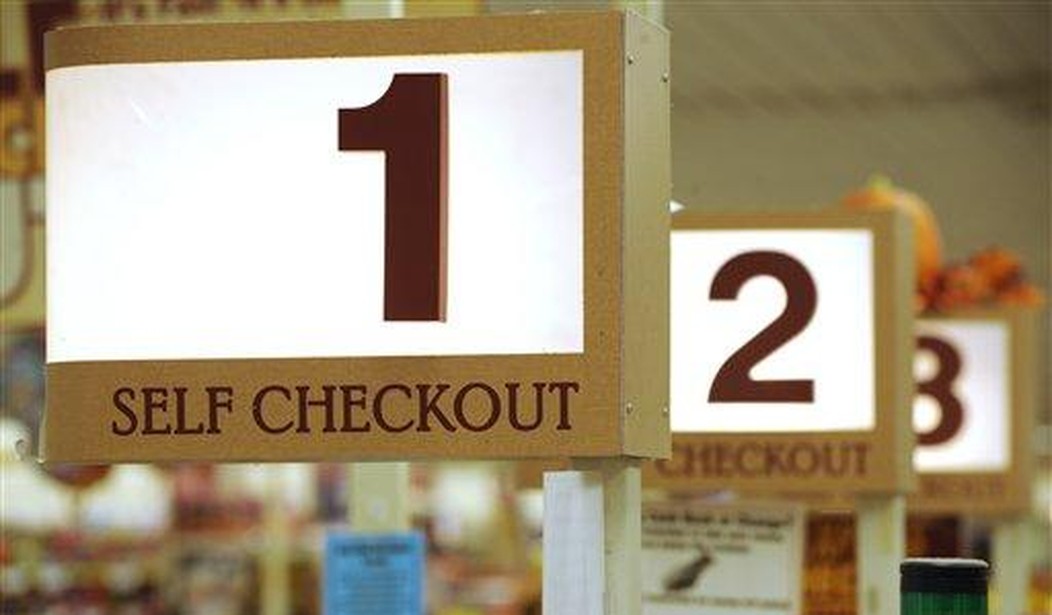One of the great consumer arts is to select the right line to stand in at checkout. What consumer doesn't weigh the merits of the old lady with eight items vs. the efficient-looking young mother with 30 items? Which of these will go into price check or coupon debate mode? Which will put you in a holding pattern as you watch other lines breeze by?
With paper-thin margins, retailers thought they'd hit paydirt with self-checkout. Cut wages, shorten lines, and make shopping, aka spending money, "easier." But instead of improving the bottom line, stores are losing money.
One study shows that retailers who rely heavily on this technology have double the industry loss rate. Shrinkage is the technical term for this loss, and it can mean the difference between solvency, survival, and store closings.
As one study notes, "there appears to an uneasy relationship between customer convenience and the wider criminogenic impacts of [self-checkout]." (How is that for a word!) This "reduces effort and risks for offenders, increases potential rewards while at the same time providing ready-made excuses for offending behaviours...Most critically, where self-scan systems are available, rates of shrinkage increase dramatically. Whether rates of shrinkage are generated by genuine error or malicious intent is unclear, though if such systems encourage otherwise law-abiding citizens to engage in crime, then the social implications could be profound."
It seems the average theft is $120, with an estimated 10 percent of scammer scanners accounting for 67 percent of these losses. Apparently, there are three ways to rob a store: 1) a gun, 2) go to a big city, fill up your arms with stuff, and just walk out, and 3) chisel the store out of products at self-checkout.
While most consumers are too timid for one and two, legions seem perfectly at home scamming the checkout scanner. In the wrestling match of technology vs. fallen human nature, fallen human nature has technology pinned to the canvas and retailers are now crying uncle.
Among the issues of theft on purpose, theft by accident, and the necessity of paying overseers to supervise consumers who seem incapable of working cash registers for free, the dream of a profit bonanza has turned into a cascade of losses. And, insult to injury, stores are paying top dollar for the equipment to facilitate this theft.
RELATED: What Will Happen When Only Self-Checkouts Remain?
Profiling their clients, Walmart is now removing self-checkout from stores in certain locations. Target is reducing the number of items that can be scanned, and Dollar General is looking to add staff. In stores you frequent, you may have noticed more full-time self-checkout employees there to help you navigate your way. And some stores are adding more in-your-face camera surveillance systems as a deterrent.
A friend who was district attorney in one of the lowest crime counties in the country told me once how, growing up near a large park in the Bronx, he got a summer job working for a Jewish man who ran the concessions. The owner told my friend to bring as many classmates as possible from his Catholic grammar school for jobs. When he showed up with his Jewish friend, the owner was upset. He pulled him aside and said, I'll give your friend a job, but I told you I wanted kids from the Catholic school. Listen, all the kids who work for me steal candy. But when the Catholic school kids go to confession, the priest makes them pay me back!
Is there anyone ready, willing, and able to make restitution to retailers for all this theft? Retailers aren't holding their breath, and checkout lines at the confessional aren't what they used to be. So, for now, widespread self-checkout technology is the god that failed. What next? Artificial Intelligence, robots, or, yikes, more humans?










Join the conversation as a VIP Member